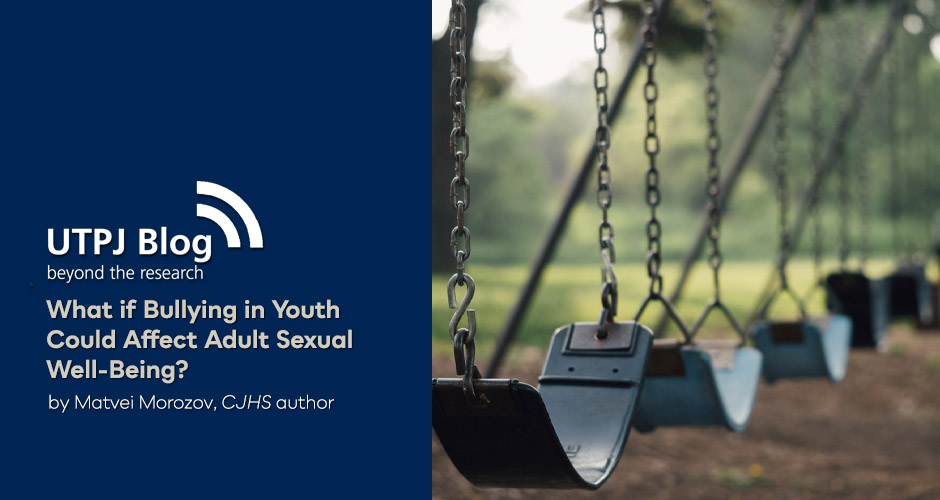
Written by guest blogger Matvei Morozov.
Being bullied by peers at school remains a pervasive problem. It is no secret just how serious the consequences of bullying can be for the physical and mental health of those who experience it. However, despite having knowledge of the effects of bullying on well-being, very little research has been done when it comes to the ways in which bullying impacts later sexual well-being. I found the lack of such studies perplexing, given how commonplace school bullying remains, how long-lasting its effects can be, and what a basic part of the human condition sex and sexuality are.
After two years of work on this study, my impression is that studying previously unexplored associations can be a double-edged sword. On one hand, the researcher is free to test a multitude of variables and models without worrying about whether their study would fail to make novel contributions; and the study’s limitations, however significant, might be more easily forgiven since there are no previous studies to surpass in terms of design quality. On the other hand, however, being among the first to research a given topic or association between specific variables means that there may be little to no studies directly relevant to establishing a sound base for your research design. It then becomes an additional challenge for authors to convincingly argue that studies on somewhat related—but distinct—topics can provide a solid enough foundation upon which to build their research question.
The results of our study on the links between school-age bullying and sexual depression in adulthood are, in my view, not surprising. Indeed, they seem logical and intuitive: our study suggests that bullying negatively affects one’s self-perception and the corresponding emotions (such as shame and anxiety), and consequently, inhibits social behaviours, which lead to meeting new people and developing new relationships—including sexual ones—and maintaining them in a way that the relationship is satisfying to the individual.
This study is only a drop in the sea of knowledge yet to be discovered about the links between bullying (or adversity more generally) in youth and sexual well-being in adulthood. Yet, if there is anything worth retaining from this study for the readers, regardless of their field of expertise, it is that current sexual well-being may well be related to factors at first glance distant, both temporally and experientially, and it may require thorough self-reflection to identify these potential connections.
About the Author
 Matvei Morozov first developed an interest for social sciences in college, upon realizing that studying health and natural sciences did not ignite in him the passion required to succeed in these domains. When time came to apply to university, his choice fell onto psychology, in which he saw the combination of interest-capturing topics and the potential to help others and contribute to their emotional health. In 2019, he graduated with a bachelor’s degree in psychology from Concordia University in Montreal. Not being able to identify a topic to the study of which he was willing to devote multiple years of his life in the general psychology program, he applied into the sexology program at the University of Quebec in Montreal that year and started his master’s degree there a year later. He is currently working on his final dissertation for that program, which he expects to complete in early 2023.
Matvei Morozov first developed an interest for social sciences in college, upon realizing that studying health and natural sciences did not ignite in him the passion required to succeed in these domains. When time came to apply to university, his choice fell onto psychology, in which he saw the combination of interest-capturing topics and the potential to help others and contribute to their emotional health. In 2019, he graduated with a bachelor’s degree in psychology from Concordia University in Montreal. Not being able to identify a topic to the study of which he was willing to devote multiple years of his life in the general psychology program, he applied into the sexology program at the University of Quebec in Montreal that year and started his master’s degree there a year later. He is currently working on his final dissertation for that program, which he expects to complete in early 2023.
His article, co-authored with his supervisor Marie-Aude Boislard, Ph.D., “Is bullying by peers in youth related to sexual depression in adulthood? A mediation model of shame, social anxiety, and body satisfaction,” was published in the Canadian Journal of Human Sexuality special issue Research Presented at the 48th Canadian Sex Research Forum.
Comments on this entry are closed.